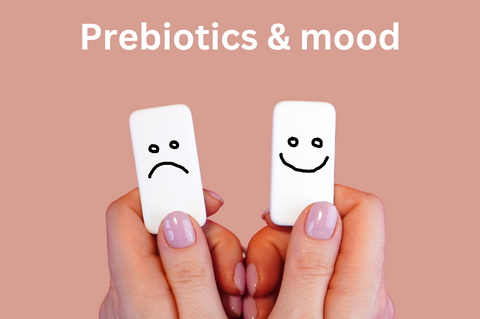Hot flashes? Mood swings? Sleepless nights? If you're experiencing any of these menopause symptoms, you're not alone — and you're not powerless, either.
This guide explores the 10 most common signs of perimenopause and menopause, and how supporting your gut with prebiotic fibre — especially from ió Gut Health Drink — may help relieve some of the discomforts naturally.
What is menopause?
Menopause marks the end of your menstrual cycle — defined by 12 consecutive months without a period — typically occurring in your 40s or 50s. Before that, many women experience perimenopause, a transitional phase with fluctuating hormones and unpredictable symptoms.
The drop in oestrogen and progesterone can lead to physical and emotional shifts. For some, the effects are mild. For others, they can be debilitating.

The top 10 most common menopause symptoms include:
1. Hot flashes
2. Night sweats
3. Irregular periods
4. Mood swings
5. Fatigue
6. Vaginal dryness
7. Memory issues
8. Joint pain
9. Sleep disturbances
10. Anxiety or irritability
Additional symptoms may include weight gain, skin changes, thinning hair, or low libido — and they often overlap with perimenopause.
Gut Health and Menopause Symptoms: What’s the Link?

Emerging research shows that your gut microbiome — the trillions of bacteria living in your digestive system — plays a critical role in hormone regulation, immunity, inflammation, and even mental health. This is where prebiotics for menopause come into play.
The gut’s connection to the brain, known as the gut-brain axis, helps regulate mood, sleep, and stress response — all of which are disrupted during menopause.
How Prebiotics for Menopause Support Your Body

Adding prebiotic fibre to your diet helps nourish your beneficial gut bacteria. A more balanced microbiome may help reduce the severity of several common menopause symptoms.
1. Mood Stabilisation: A healthy gut microbiome can help regulate mood and reduce the severity of mood swings, a common symptom during menopause. Read more about prebiotics and mood.
2. Weight Management: Prebiotics can contribute to a healthy weight by improving metabolism and helping to maintain a healthy balance of gut bacteria, potentially mitigating menopausal weight gain. Read more about prebiotics and weight management.
3. Bone Health: By enhancing the absorption of essential minerals, prebiotics can support bone health and reduce the risk of osteoporosis during menopause.
4. Digestive Comfort: Prebiotics can alleviate digestive discomfort and bloating and constipation, which may become more pronounced as hormone levels fluctuate during menopause. Read more about the benefits of prebiotics for optimal digestive health and prebiotics for constipation.
5. Prebiotics and sleep: Prebiotics are important during menopause as they can help support a healthy gut microbiome, reduce sleep-disrupting symptoms like mood swings and stress, and indirectly contribute to better sleep quality for women undergoing this hormonal transition. Read more about the best prebiotic for sleep.
Why ió Gut Health Drink Is a Smart Gut Health Supplement
You could eat 10 bananas or 4 onions daily to get enough prebiotic fibre — or you could just enjoy one refreshing bottle of ió Gut Health Drink.
Formulated with science-backed chicory root fibre (inulin), each bottle delivers:
-
100% of your daily prebiotic fibre
-
20% of your daily fibre
-
No added sugar
-
Only 21 kcal
-
Vegan and gluten-free
-
No artificial sweeteners or preservatives
It’s a delicious, convenient way to support your gut — and by extension, your hormones, mood, and energy.
Real Results: The 12-Day Challenge
In our 12-day trial, 41 people drank one ió Gut Health Drink per day. The results?
-
75% had improved digestive health
- 73% reported better sleep
-
73% snacked less
-
69% noted improved mood
- 66% experienced improved regularity
 Thousands of women are now making ió part of their daily wellness routine.
Thousands of women are now making ió part of their daily wellness routine.
Use code MENO15 to get 15% off your first order by clicking here and adding this code at checkout.
Don't take our word for it! Check out the honest reviews from real people here.
Why not take part in our 12-Day Challenge and experience the health benefits our ió lovers are raving about?
You can also read about our Glasgow Caledonian University study, which found that ió fibrewater increased friendly gut microbes (probiotics) significantly.
Take the 12-Day Gut Health Challenge
Feel the difference in just 12 days. Join thousands of women who’ve improved digestion, sleep, energy, and eased menopause symptoms — all by drinking one bottle of ió Gut Health Drink per day.
👉 Use code MENO15 for 15% off your first order and get started today by clicking here.
How to Add More Prebiotic Fibre to Your Diet
Aside from ió Gut Health Drink, here are a few prebiotic-rich foods that support your microbiome:
-
Whole grains: oats, barley, rye
-
Legumes: chickpeas, lentils, black beans
-
Fruits: bananas, apples
-
Vegetables: garlic, onions, leeks, asparagus
-
Nuts and seeds: flaxseeds, chia, almonds
But reaching the effective daily dose of 4.5g from food alone is tough — that’s why a gut health supplement like ió makes all the difference.
Read more about prebiotics:
Prebiotics vs Weight Loss Injections
Final Thoughts: Can Prebiotics for Menopause Really Help?
Menopause symptoms are part of a natural transition — but that doesn’t mean you have to suffer through them.
By focusing on gut health and consistently incorporating prebiotic fibre, you may ease symptoms like bloating, brain fog, mood swings, and poor sleep — all while nourishing your body from within.
Want a simpler way to get started? Try ió Gut Health Drink and feel the difference for yourself.
🎁 Use code MENO15 for 15% off your first order.
For further information please go to the NHS website 'Common symptoms of menopause and perimenopause'.







